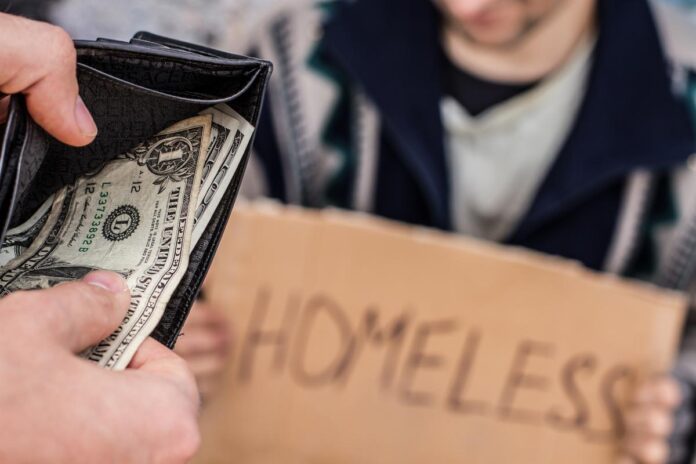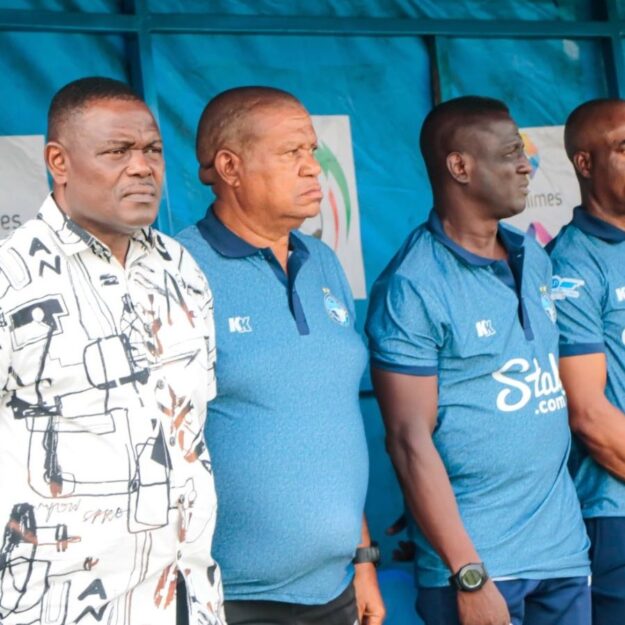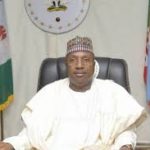Advertisement
One will ask “Will giving money to the poor help to solve the problem of
poverty in Nigeria? Giving the poor money can bring great relief, it is
important to note that poverty is a big deal with deep-rooted causes
that needs serious tackling to terminate the reign of poverty and this
can be achieved by offering or giving money to the poor through a
notable non-governmental organization In Nigeria such as Helpers Social
Development Foundation. It is worthy to provide financial aid to those
living in poverty in Nigeria, but giving money to poor Nigerians is not
a sustainable solution to the issue of poverty.
Empowering talented Nigerians with the skills they needed is the best
approach to building a sustainable future for all. Poverty is a state
or condition in which one lacks the financial resources and essentials
for a certain standard of living. Poverty is a great challenge in
Nigeria, seriously affecting a significant number of its citizens. In
the recent World Bank report, Poverty is calculated by the number of
people living below $1.90 per day. It is an issue that has multiple
areas to be addressed as to the cause. Poverty cannot be properly
understood and the cause aired due to the fact that it can be linked to
multiple natures of the problem.
According to Highlights of the United Nations publications on the 2022
Multidimensional Poverty Index, there are about 63% of persons living in
Nigeria (133 million people) are multidimensionally poor.
Causes of Poverty
It is of great importance also to look into the numerous causes of
poverty and then work towards seeking or sourcing the possible solution
to these causes that will eventually curb the problem of poverty in
Nigeria. The world Bank report, there is a slow growth rate as well as
low human capital which blocks the poverty reduction in Nigeria. Giving
Money to Poor Nigerians will help them to escape poverty.
5 issues Affecting Nigeria’s Growth and How to Prevent by giving money
1. Poor Education and classroom funding:
In Nigeria, many citizens have limited access to quality education,
which is one of the prominent factors contributing to poverty in this
country. In the United Nations report, One out of every five out of
school children is in Nigeria. In most rural parts of Nigeria, children
are marginalized and these children lack access to schools and
educational materials. This education factor creates a mighty gap and
limits the opportunity of these out-of-school children from getting some
required knowledge and insight into so many things about life. Poor
classroom funding and lack of a conducive environment for learning in
public schools contributed to children dropping out of school in
Nigeria. This particular problem can be averted by giving equal
opportunity to all children to get good skills and knowledge needed to
help them break free from the circle of poverty.
2. Inadequate access to health services
The United Nations Sustainable Development Goal 3 aims to promote good
health, especially in poor nations like Nigeria. Lack of healthcare
equipment and services also plays a massive role in Nigeria’s poverty
issue. A lot of Nigerians find it so hard to have access to good
healthcare services, leading to many preventable sicknesses and possible
deaths. Most of our government-owned hospitals and health centers lack
the provision of good healthcare amenities, and supervision to monitor
the activities of health workers. Workers in government-owned hospitals
franchise poor Nigerians the opportunities to access free medical care
because the majority of government own hospitals have taken the
facilities as their private business. Some families in Nigeria who tried
to go to private hospitals to get these good healthcare services can
push them into poverty because most Nigerians are in the middle class
and any small expenses move them downwards towards poverty. So
initiating investments in the government healthcare sector and health
education with proper supervision of staff can improve Nigeria as a
country and also reduce the incidence of death in Nigeria,
High Unemployment and Underemployment rates among youth
Most youth do not earn enough income to compact daily expenses in the
report published by the World Bank in 2020, About 4 of every 10
Nigerians are living under the poverty Line. These statistics also show
that there are millions more who are capable of falling below the
Poverty Line. Among those living below the $1.90 poverty line in
2018/19, 84.6 percent lived in rural areas and 76.3 percent lived in the
North Central, North East, or North West zones. According to Highlights
of the United Nations publications on 2022 Multidimensional Poverty
Index there are about 63% of persons living in Nigeria (133 million
people) are multidimensionally poor. Addressing poverty in Nigeria
requires a lot of sustainable economic empowerment, diversification, and
job creation. And also the entrepreneurs should be encouraged in many
areas to support them and also to encourage younger minds to have
admiration and work towards owning their own businesses.
Gender-based inequality:
Systemic inequalities, such as gender inequalities and regional
differences, cooks poverty in Nigeria. In 2019, the World bank report
states that the Vulnerable employment among women is 85.2% and among men
is 74.9% in Nigeria for 2019. The Female gender, in particular, is faced
with a great hindrance to accessing good education, employment, and
decision-making roles. Most Nigerian homes still firmly believe that the
place of a girl child is in the kitchen and as such should not be
properly educated even if she struggles to get a basic education, she is
pushed into marriage at an early stage and most of the time the
individual dreams and aspirations will be cut short and so the cycle
continues from the stone age till date. Eradicating gender inequalities
and ensuring equal opportunities for all citizens can help break the
circle of poverty and foster social cohabitation and inclusive
development.
Lack of Basic social amenities
The Basic social amenities include lack of clean drinking water, low or
no power supply, and means lack of good means of transportation among
many other things that breed poverty in Nigeria. In the report tendered
by the World Bank in 2021, about 60 million in the Nigerian population
have no access to clean drinking water and about 80 million people live
without improved sanitation facilities These amenities hinder economic
activities and also hinder the delivery of essential services to the
citizens of this country. If Nigeria can provide a viable condition for
economic growth by providing the basic social amenities needed, this
will improve its citizens’ economic and social life. Sincerely to
understand and cut the ties of poverty in Nigeria, it is very very
important to identify the connecting points of these factors. Poverty
simply put is not simply a lack of money or wealth but a result of
systemic issues that require comprehensive solutions.
Ways to Combat Poverty In Nigeria through Helpers Social Development
Foundation:
Poverty as a problem can be solved in Nigeria by giving out money to
implement a sustainable program with NGOs in Nigeria working with the
underserved. Helpers Foundation as one of the top NGOs in Nigeria are
closer to the grass root so they know what the people need more and how
best to get to these people to get their problems solved. Poverty
eradication can actually be made possible through having targeted
intervention programs in job creation for Nigerian youth and women.
Giving money to the poor through like Helpers Foundation will help to
make education to be available to everyone. Building infrastructures
like classroom building, skill acquisition centers, and building
hospital facilities in underserved communities in Nigeria is one of the
best ways you can collaborate with nonprofit organizations like Helpers
Social Development Foundation to make Nigeria achieve her dream. Poverty
in Nigeria can best be achieved through giving out money to the poor in
collaborating with Helpers foundation. Every Nigerian child is smart but
they never see the opportunity to achieve their potential.
Non-governmental organizations (NGOs) play a significant role in
mitigating the issue of poverty in Nigeria. They operate independently
of the government and work towards improving the lives of people living
in poverty government cannot meet their needs.
Helpers Social Development Foundation is one of the top non-government
organizations in Nigeria that established free schools for the poor in
Nigeria. Helpers Foundation believed that education plays a critical to
the growth of every child.
Here are some ways in which Helpers Social Development Foundation is
helping to address poverty in Nigeria:
Will Giving Money to the Poor Solve the Problem of Poverty in Nigeria
How to partner with Helpers Foundation to impact lives in Nigeria
1. Education and Skill Development:
Many Charity organizations in Nigeria focus on providing education and
skill development programs to empower individuals living in poverty.
Helpers Social Development Foundation establish schools, built toilet
facilities in public schools using open defecation, mentoring program
for children, and adult literacy programs to improve access to education
and implement child marriage and sexual exploitation. Funding charity
organizations in Nigeria such as Helpers Social Development Foundation
will help to facilitate the Education and skill development of children
in rural areas.
2. Healthcare and Sanitation:
Helpers Social Development Foundation as an NGO in Nigeria works towards
improving healthcare and sanitation facilities in impoverished areas of
Nigeria through child education. They set up medical outreach from time
to time, and community health programs to provide basic healthcare
services, immunizations, and awareness campaigns on hygiene and
sanitation practices. Giving monetary assistance to Helpers Social
Development Foundation as a Non-governmental Organization will aid to
mitigate Healthcare related issues in Rural areas.
3. Advocacy and Policy Influence:
Helpers Social Development Foundation works to raise awareness about
poverty-related challenges, influence policies, and promote social and
economic inclusion. By collaborating with the government and other
stakeholders, Helpers Foundation aims towards creating an enabling
environment for poverty reduction. Giving money and partnering with
Helpers Social Development Foundation will help to organize
sensitization programs to educate people on the Policies.
4. Women’s Empowerment and Gender Equality:
Most Non-governmental Organization in Nigeria focuses on women’s
empowerment and gender equality Education. Helpers Social Development
Foundation promotes access to education to everyone, healthcare, gender
equality, and legal rights for women and girls. By addressing gender
disparities, Helper Foundation contributes to poverty reduction and
social progress. Join in donors funding Helpers Social Development
Foundation mission that focuses on Gender Equality sensitization.
Will Giving Money to the Poor Solve the Problem of Poverty in Nigeria
These are just a few examples of how Nigeria non-governmental
organizations are actively involved in mitigating poverty in Nigeria.
Their efforts complement the government’s initiatives and help create a
more inclusive and equitable society. This article is all about Will
Giving Money to the Poor Solves the Problem of Poverty in Nigeria
Related
Advertisement
You may be interested

Watford Make Short-Term Proposal To Iheanacho
Webby - January 4, 2025Sky Bet Championship club, Watford are looking to sign Kelechi Iheanacho on loan for the remainder of the season.Iheanacho linked…

Tragedy As Nwabali Loses Mother
Webby - January 1, 2025Super Eagles and Chippa United goalkeeper Stanley Nwabali has suffered another tragedy following the death of his mother.Nwabali shared the…

Juventus Interested In Asensio
Webby - January 1, 2025According to a report from Foot Mercato, Juventus are interested in Paris Saint-Germain’s Marco Asensio as they look to bolster…

















![American Pastor, David Wilson Seen Eating The Box Of Woman Who Isn’t His Wife [Video]](https://onlinenigeria.com/wp-content/uploads/2019/10/american-pastor-david-wilson-seen-eating-the-box-of-woman-who-isnt-his-wife-video-150x150.jpg)









